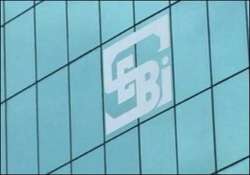MCX-SX is well ring-fenced from NSEL crisis: Sebi
Mumbai: Sebi Chairman UK Sinha today allayed fears of crisis at the parent group of MCX-SX spilling over to the bourse saying that the troubled Financial Technologies- promoted stock exchange is ring-fenced from other group

Mumbai: Sebi Chairman UK Sinha today allayed fears of crisis at the parent group of MCX-SX spilling over to the bourse saying that the troubled Financial Technologies- promoted stock exchange is ring-fenced from other group firms.
“I would like to clarify that the promoters of these companies (MCX and the crisis-hit spot exchange NSEL) are also promoters of a stock exchange (MCX-SX) that we regulate. But I would like to assure you that we are very conscious that the entity we regulate is throughly ring-fenced,” Sinha told reporters when asked whether he fears the trouble at the promoter company would engulf MCX-SX.
Sinha was speaking on the sidelines of a capital markets summit organised by the Indian School of Business here.
Sinha also pointed to the change of management at the bourse saying: “I would like to point out that there was a complete change of management at MCX-SX with two public interest directors being nominated by Sebi. “Since we are worried about risk management we have also verified the collaterals and other securities required for this settlement. For the point of view of settlement, good governance and for insuring the market that things are alright we have taken many steps.”
The Jignesh Shah-promoted Financial Technologies run a clutch of market institutions—the stock exchange MCX-SX, commodities bourse MCX and the commodities spot exchange NSEL, which had been shut following a Rs 5,600-crore payment crisis on July 31.
Following the crisis, the group companies had come under probe and authorities had frozen assets of Shah and his right- hand man Joseph Massey. The two had quit from senior positions from all the exchanges.
On the new disclosure norms for Mutual Funds, Sinha said the regulator is not asking for extra disclosures but only trying to plug the loopholes which were rampant.
“We have decided to now look at adequacy of disclosures and not extra disclosures. Accordingly, promoter shareholding which is pledged should be disclosed, this is a requirement under SAST regulations,” he said. “We have found that using very innovative methods, advised by very powerful legal firms, companies came out with a method called NDU (non-disposal undertaking) and various other methods of creating encumbrance. We have not created a guideline that any sort of encumbrance has to be reported,” Sinha added.
On the progress made on the setting up of self-regulatory organisations (SROs) for the MF industry, Sinha said Sebi has so far received three applications from AMCs' distribution side. It should be the job of an SRO to regulate distributors and we hope to make progress on it soon, he added.
“I would like to clarify that the promoters of these companies (MCX and the crisis-hit spot exchange NSEL) are also promoters of a stock exchange (MCX-SX) that we regulate. But I would like to assure you that we are very conscious that the entity we regulate is throughly ring-fenced,” Sinha told reporters when asked whether he fears the trouble at the promoter company would engulf MCX-SX.
Sinha was speaking on the sidelines of a capital markets summit organised by the Indian School of Business here.
Sinha also pointed to the change of management at the bourse saying: “I would like to point out that there was a complete change of management at MCX-SX with two public interest directors being nominated by Sebi. “Since we are worried about risk management we have also verified the collaterals and other securities required for this settlement. For the point of view of settlement, good governance and for insuring the market that things are alright we have taken many steps.”
The Jignesh Shah-promoted Financial Technologies run a clutch of market institutions—the stock exchange MCX-SX, commodities bourse MCX and the commodities spot exchange NSEL, which had been shut following a Rs 5,600-crore payment crisis on July 31.
Following the crisis, the group companies had come under probe and authorities had frozen assets of Shah and his right- hand man Joseph Massey. The two had quit from senior positions from all the exchanges.
On the new disclosure norms for Mutual Funds, Sinha said the regulator is not asking for extra disclosures but only trying to plug the loopholes which were rampant.
“We have decided to now look at adequacy of disclosures and not extra disclosures. Accordingly, promoter shareholding which is pledged should be disclosed, this is a requirement under SAST regulations,” he said. “We have found that using very innovative methods, advised by very powerful legal firms, companies came out with a method called NDU (non-disposal undertaking) and various other methods of creating encumbrance. We have not created a guideline that any sort of encumbrance has to be reported,” Sinha added.
On the progress made on the setting up of self-regulatory organisations (SROs) for the MF industry, Sinha said Sebi has so far received three applications from AMCs' distribution side. It should be the job of an SRO to regulate distributors and we hope to make progress on it soon, he added.